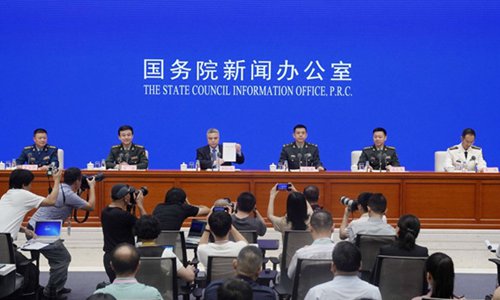HOME >> OPINION
Peace paramount in defense white paper
Source:Global Times Published: 2019/7/25 21:18:40

Photo: Xinhua
Editor's Note:
China on Wednesday issued a white paper on national defense titled "China's National Defense in the New Era," the 10th one which the Chinese government has issued since 1998. What message does the white paper convey? What is its significance in the context of tensions between China and the US? The Global Times talked to two Chinese experts on the issues.
Zhou Bo, director of the Security Cooperation Center of the Office for International Military Cooperation at China's Ministry of National Defense
The white paper emphasized China will never seek hegemony, expansion or spheres of influence, which has been repeatedly stressed by China on different occasions. But incorporating it into the defense white paper is of particular importance. China's military strength has increased significantly, causing concern among some Westerners. But an undisputable truth is that although China has maritime disputes with some countries over the South China Sea, China over the past four decades has stuck to peaceful development.
The West has long believed a strong country would inevitably seek hegemony. This is a stereotyped way of thinking. Facts speak louder than words. Since the beginning of reform and opening-up, China hasn't used its growing military strength for aggression and expansion. During a phone conversation between former US president Jimmy Carter and incumbent US President Donald Trump in April, Carter said to Trump, "Since 1979, do you know how many times China has been at war with anybody? None. And we have stayed at war." What China has done and is doing defies the old practice of a strong power seeking hegemony.
China is still in a period of strategic opportunities and we will continue to stick to peaceful development. But the problem is that difficulties on the way to peaceful development have increased. The US has defined China as a strategic competitor, which makes such development more uncertain. Besides, the US has stepped up freedom of navigation operations in the South China Sea under the Trump administration, making crisis management more difficult.
As the white paper said, the US is undermining global stability. Two significant examples: It unilaterally withdrew from the Iran nuclear deal and threatened to terminate the Intermediate-Range Nuclear Forces Treaty. The US announced its withdrawal from the INF treaty first, then Russia suspended its compliance with the treaty in response. This has affected the strategic stability between the US and Russia, causing anxiety across the world. Moreover, if the US formally pulls out of the INF treaty, so much would be uncertain regarding the prospects of the new START, also known as Strategic Arms Reduction Treaty. It's fair to say that the US is destroying global strategic stability.
Under such circumstances, China must step up transforming its armed forces into a world-class military that is ready to fight and win wars, as Chinese President Xi Jinping, also general secretary of the Communist Party of China Central Committee and chairman of the Central Military Commission ordered. We need powerful military forces to realize national rejuvenation and safeguard world peace. But noticeably a world-class military doesn't mean a bellicose and aggressive force.
Li Jie, Chinese military and naval expert
Currently, the US wants to contain China through a trade war and other means in spheres such as politics, diplomacy and military. It seeks to crush the second-largest economy eventually.
Hence, Beijing needs to continue to improve its military capability, enhance its security and thwart US and Western attempts to block, contain and bully China.
The white paper said "China will never seek hegemony, expansion or spheres of influence."
Seeking hegemony, the beaten path of Western great powers, is ingrained in their nature. Traditional imperialist and capitalist nations such as the UK and the US need to plunder other countries' resources, such as labor and oil, to fuel their development.
However, since ancient times, even when China was one of the greatest powers during the Tang (618-907), Song (960-1279), Ming (1368-1644) and Qing (1644-1911) dynasties, this Asian country never resorted to bullying. Today, China will not change the practice and continue to develop together with other nations and devote itself to building a community of shared future for mankind.
On the Taiwan question, the white paper says, "The 'Taiwan independence' separatist forces and their actions remain the gravest immediate threat to peace and stability in the Taiwan Straits and the biggest barrier hindering the peaceful reunification of the country" and "The PLA [People's Liberation Army] will resolutely defeat anyone attempting to separate Taiwan from China and safeguard national unity at all costs."
Compared with the white paper issued in 2013 and 2015, this one devotes a separate paragraph to the Island of Taiwan, not mincing words, which shows that the Chinese government attaches more importance to Taiwan.
Currently, secessionist forces, such as those in Taiwan and Hong Kong, tend to be increasingly rampant. Xinjiang, Tibet, Hong Kong and Taiwan are all inseparable parts of China.
We need to be wary of attempts of certain Western forces to split China by utilizing the secessionists. We should be fully prepared. If needed, we would resort to force to address the Taiwan question, though we hope to realize peaceful reunification.
Posted in: VIEWPOINT